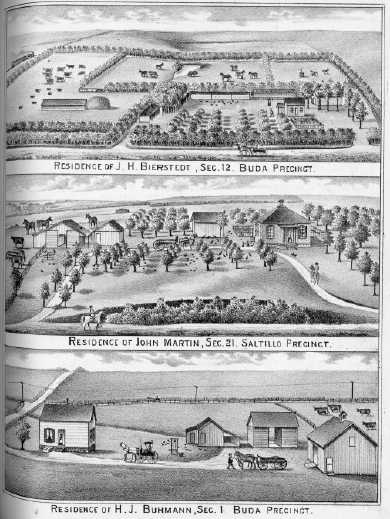and sees on every hand indications
of wealth and prosperity in the busy traffic going, in
the fine business buildings, and in the stately,
beautiful dwellings on every side. When he first came
here Mr. Benadom commenced dealing in furs, and for
twelve years handled all the furs sold in Lincoln. In
1869 he entered into the business of building dams,
and in six years time had constructed thirty-nine dams
in different parts of Nebraska. Some years after
coming to Lincoln he bought wild land, which he
improved, and he is now the owner of 320 acres of
well-improved land in Thayer County, and also owns
other land there. He erected two blocks in the city of
Carleton, one of which he still owns, and he has
erected several houses in Lincoln.
Mr. Benadom has been twice married.
Fidelia Burroughs, his first wife, was born in
Vermont, and died in Iowa in 1866, leaving eight
children--Almina, Emma, Mary, George W., Alice,
Wilfred, and two who died in infancy. The second
marriage of our subject, which occurred in 1867, was
to Miss Hannah Jones, and to them two children have
been born, but they are now dead. Mr. Benadom is a man
of sound principles, is trustworthy as a citizen, and
his character in private life is unassailable. In
politics he is a stanch Democrat, and at the same time
a strong Prohibitionist.

 ORNELIUS
WISMER is a partner in the firm of Rowerdink &
Wismer, dealers in general merchandise, at Hickman,
Neb. His parents, John and Frona (Boelkens) Wismer,
were natives. of Holland, in which country they were
married. The husband was a farmer, and they emigrated
to America in 1852, settling in Sheboygan County,
Wis., where he bought a farm, and continued until his
death, at the age of fifty-four years, in 1876. The
mother still resides in Sheboygan County, aged sixty
years, having been the mother of ten children, four
boys and six girls. ORNELIUS
WISMER is a partner in the firm of Rowerdink &
Wismer, dealers in general merchandise, at Hickman,
Neb. His parents, John and Frona (Boelkens) Wismer,
were natives. of Holland, in which country they were
married. The husband was a farmer, and they emigrated
to America in 1852, settling in Sheboygan County,
Wis., where he bought a farm, and continued until his
death, at the age of fifty-four years, in 1876. The
mother still resides in Sheboygan County, aged sixty
years, having been the mother of ten children, four
boys and six girls.
Our subject, the second child, was
born on the 14th of September, 1848, in Holland. He
has but a faint remembrance of his Fatherland, having
been but four years old when he was brought to
America, and the long voyage of seven weeks on the
sailing vessel has left but little impression on his
mind. He grew up at Sheboygan on the farm, and his
parents being in moderate circumstances he began to
work out at an early age, the acquiring of an
education being limited to a few months in the winter
time. Realizing the importance of all education, and
denied many of the privileges of securing it, he spent
his leisure time in general reading, and thus acquired
a splendid stock of information on general topics.
In 1869, in company with his cousin,
N. Poort, Mr. Wismer came to Nebraska, stopping for a
time in Lincoln, and thence going out in search of
land, he took a homestead of 160 acres in South Pass
Precinct, clearing it of all incumbrance by 1874.
Previous to this time, in 1873, he was united in
marriage to Miss Hannah Wissink, a daughter of Martin
and Emma Wissink. Mrs. Wismer was the third of a
family of seven children born in Sheboygan County,
Wis., the date of her birth being in 1855. She enjoyed
the advantages of the common schools, and came to
Nebraska a miss of thirteen with her parents, who had
come to Wisconsin from Holland, afterward moving to
Nebraska, in 1869. The father took up a homestead, and
is now very comfortably situated, residing with his
son in South Pass, being sixty-two years old. The
mother of Mrs. Wismer died in 1874, which loss was
much mourned by her family.
After marriage our subject continued
on his farm until 1883, when he went into partnership
with Mr. Rowerdink in general merchandise. He still
owns his farm, which he has well cultivated, and
improved with good buildings. There is an orchard of
200 trees, containing apple, plum, cherry and other
fruit trees. He built the store in which the firm is
now doing business, and his trade steadily increased
until now it is second to none in Hickman, the public
appreciating the fair manner in which it has been
treated by the firm as a house of strict integrity.
The firm of Rowerdink & Wismer will always be
remembered by its appreciation and numerous
customers.
The subject of our sketch is the
father of seven children, all living at home; their
names are as follows: Martha, Jennie, Tilda, Frank,
John, Daniel and Oscar. The father is a member of the
Dutch
|


